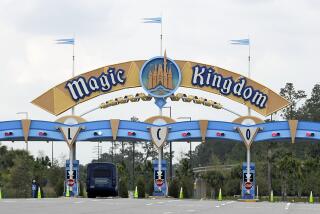Fiber Optic Firm Alleges Disney Hurt Reputation
- Share via
A fiber optic company that lit up floats for the Light Magic Parade that fizzled at Disneyland last year contends the Magic Kingdom planned the parade so poorly that it darkened the lighting company’s reputation.
In a breach of contract and slander lawsuit, Lazarus Lighting Design Inc. says Walt Disney Co., after shutting the parade down early, failed to pay Lazarus for $667,000 of the $2.6 million in work it had performed.
The suit seeks payment of those funds and at least $1 million to cover additional lost business. Seeking unspecified punitive damages, it says Disney wrongly tried to blame the debacle on Lazarus’ fiber optic work, tarnishing the company’s reputation in the industry.
Tom Brocato, a Disneyland spokesman, declined to comment on the litigation, filed last week in Los Angeles Superior Court. He said the company has a policy against discussing lawsuits.
Lazarus, based in Disney’s headquarters city of Burbank, said it had contracts to design and build four floats for Light Magic and to devise elaborate illuminations for the area in front of the park’s “It’s a Small World” ride, where the parade ended.
The Light Magic Parade was budgeted at $20 million overall, although some observers believe it ultimately cost the theme park at least twice that much. It replaced a longtime favorite at the Anaheim park, the Main Street Electrical Parade.
Critics and park patrons generally turned thumbs down on the new show, which was mothballed after a single summer season. Disney officials said at the time it would require two years to retool Light Magic. They plan to substitute an event based on the animated Disney film “Mulan” this summer.
Lazarus officials declined to discuss the lawsuit. The company’s lawyer, Tova Kitron of West Hollywood, didn’t return calls.
The company’s suit says the float design was the largest and most advanced fiber optic project ever undertaken, with “more than 4,000 miles of fiber optics and 32 long-loop, 80-inch film illuminators.” Lazarus also was to install 95 of the illuminators at Small World, it says.
The suit contends that Disney should have supplied storyboards charting the parade, along with technical specifications for the lighting, immediately after signing the contract for the floats on June 17, 1996.
Instead, it says, Disney did not supply storyboards until late February 1997, three months before the parade was to begin. It says Disney made no fewer than seven change orders to the length, number and type of illuminators, the last occurring on May 7, 1997, 16 days before the parade opened.
The most disastrous alteration, Lazarus contends, was Disney’s insistence on scrapping proven scrolling illuminators that had been 95% completed. Instead, Disney insisted on an untested technology, liquid crystal diode projectors, the suit maintains.
Lazarus says it “used its best efforts” to convince Disney that the “technology was unfit to be applied to plaintiff’s fiber optics.” It says it urged the park to conduct its own thorough investigation of the technology, but Disney disregarded its advice and bought the new projectors.
According to the suit, Disney maintains that Lazarus owes it more than $1.2 million, mostly for the costs of the new projectors.
The suit also accuses Disney of slandering Lazarus in the lighting and entertainment industry--a serious charge since Lazarus is one of only three companies that design fiber optic effects for the entertainment industry.
The suit also asks the court to order Disney not to interfere with Lazarus’ pending bids on several theme park and theme restaurant projects for other companies.
More to Read
Inside the business of entertainment
The Wide Shot brings you news, analysis and insights on everything from streaming wars to production — and what it all means for the future.
You may occasionally receive promotional content from the Los Angeles Times.











